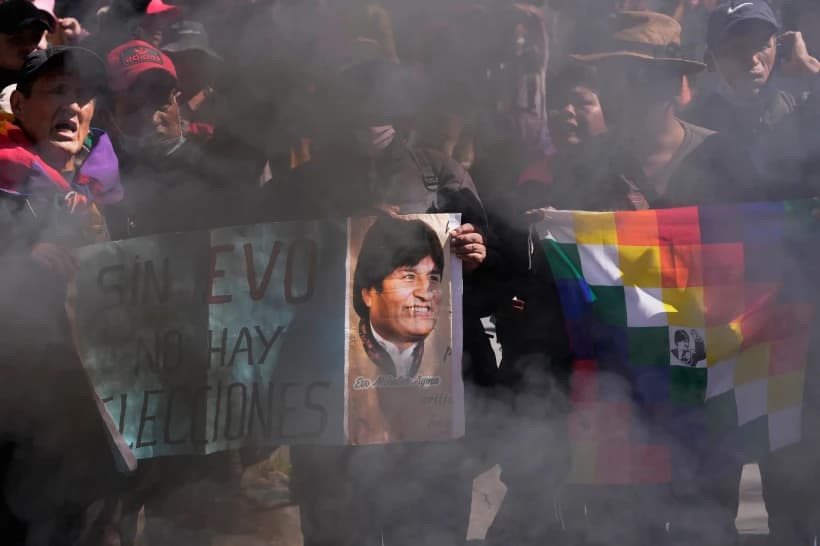SÃO PAULO, Brazil – As Bolivians prepare to elect their new president on Aug. 17, social divides grow more and more profound in the South American nation which since the beginning of June has been facing a political crisis, described by the Catholic bishops as a “spiral of violence.”
Demonstrators blockaded roads in the central province of Chapare, a region politically dominated by former President Evo Morales, and then spread their protest across other Andean areas.
The fundamental reason for the demonstations is the fact that Morales, who ruled the country in three different administrations, wants to run for president again, something that is forbidden by the Constitution – which allows only two terms for a president. As the Constitutional Court didn’t approve his candidacy, his supporters engaged in several acts of protest, especially the blockades.
The crisis intensified ancient social and political divisions in the country, pitting Indigenous groups and coca producers – who support Morales – against urban citizens.
The peak of the conflict occurred between Jun. 10-11 in the city of Llalagua, located at an altitude of 13,000 feet, in the north of the Potosi department. The local road, which connects the city to Oruro, had been shut down by Indigenous demonstrators. The urban dwellers were against the protest and asked for the intervention of security forces.
The police were received brutally, and three agents were shot dead. The army was called and took control of the situation. At least 50 people ended up being injured. Another policeman was killed in Cochabamba. An Indigenous person died during an attempt to use explosives.
“The city residents were desperate after two weeks of blockades, because there’s a general lack of food and other products in the markets. So, they tried to confront the demonstrators, but there was violence. That’s when the police and the Army were called,” Father Guillermo Siles, a member of the Missionary Oblates of Mary Immaculate who lives in Llalagua, told Crux.
The army discovered, after occupying the area, that there’s a production of marijuana and coca there, according to the local press.
Now, most of the blockades were suspended, as Bolivians prepare for Corpus Christi and the Aymara’s new year’s, which are national holidays.
“We fear that next week, without an agreement, roads may be shut again,” Bishop Giovani Arana of El Alto told Crux.
He said that in many dioceses people didn’t have any kind of reserve of food for that period and rapidly began to starve.
“Local parishes have been helping the people who are most in need,” Arana said.
Besides the pro-Evo Morales protests, Bolivians have been dealing with a chronic difficulty to buy some food items, like beef, chicken, and cooking oil. They’re scarce in grocery stores, and their prices went up – in some cases, reaching a 300 percent increase.
“It’s been 10 years since the gas reservations were over and the government didn’t find any other way to generate strong currencies, especially dollars,” explained Siles. But, even so, it kept subsidies for several items.
“The government now ran out of dollars and faces difficulties buying gasoline and diesel. The people have to get into long lines in order to buy fuel,” he said.
The lack of dollars has been impeding people to withdraw money from their own bank accounts in dollars over the past months.
“And all prices went up. Brazilian coffee used to cost US$ 5, and now it costs US$ 20,” Siles said.
The level of dissatisfaction rapidly grew. With the blockades, chaos emerged in different regions and violence was easily sparked.
In Llalagua, for instance, where Siles heads a Catholic radio called Pius XII, which has been on air for decades, the social division between urban citizens and members of the large Indigenous groups in the area became unbearable.
“We have always been side by side with the oppressed. Here’s a mining region and we always supported miners, especially during the military dictatorships in the past,” Siles said.
Now, mining workers think the Catholic priests are against their activity, just because they have been preaching that everybody should take care of the environment.
“And the Indigenous communities would want us to follow Morales. So, the civil society and the Indigenous communities don’t feel identified with the radio right now,” he complained.
He said that the ancient hatred of non-Indigenous groups towards them has reappeared.
The Church released a statement last week calling for the immediate cease of hostilities all over the country. The bishops continue to accompany the situation.
“We’ve been ready to mediate and facilitate the dialogue between the different parts of that conflict, but there hasn’t been any sign of disposition coming from them,” Arana said.
He added that now even the national Church has been suffering with the theme of finances, given that most help it gets comes from other countries, which donate in euro or dollar.
“But we can’t withdraw the money,” he complained.












